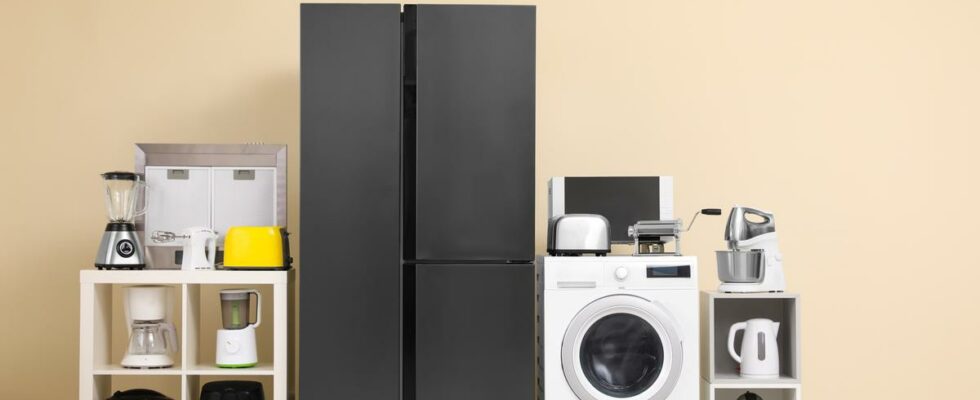Since the introduction of this bonus, repair requests for household appliances have continued to increase. New Africa / stock.adobe.com
Deducted from the invoice, the aid allocated for the repair of devices encourages more and more French people to consider this option rather than throwing it away.
A failing refrigerator, a broken dishwasher, or even a leaking coffee machine… Before getting rid of your defective products, make sure they have breathed their last. Since mid-December, consumers have been able to benefit from a repair bonus on around twenty electrical and electronic appliances. To see the bill lighten by an amount ranging from 10 to 45 euros depending on the product, all you have to do is go to repair points that bear the QualiRépar label.
Read alsoThe madness of high-end small household appliances
Since the introduction of this bonus, as part of the anti-waste law for a circular economy, requests for repairs for household appliances have continued to increase. “It is estimated that the repair bonus leads to increases of around 15% even if there is a lack of hindsightsays David Tourquetil, service and circular economy director at Boulanger. According to Claire Lemarchand, communication director of Ecosystem, “those launched in this process have reaped the benefits from the first weeks: they have more repairs, more business and more loyal customers“.
The bonus is deducted directly from the final price paid by consumers. It is then up to the repairers to send the invoice to eco-organizations (Ecosystem or Ecologic), which have an envelope dedicated to the device in order to reimburse them. The money comes mainly from the eco-contribution, which is an additional cost added to the selling price of the devices. With nearly 1,000 sites labeled according to Ecosystem, 28% of repairers are still self-employed and craftsmen. The objective is to have more and more repairers carrying the label. So 200 are about to have it and 1000 others are waiting.
SEE ALSO – Pierre Duchier: “The health crisis has boosted household appliance sales”
Only 36% of French people repair their devices
The most repaired products are washing machines, dishwashers, refrigerators, but also telephones and laptops. Consumers are increasingly taking the repair aspect into account in their selection criteria, explains Camille Beurdeley, general manager of Gifam, a group of home appliance brands. According to a study by Ademe, 81% of French people have a good image of the repair of their products, but only 36% of them do so in practice. One of the major obstacles remains the cost, especially when it is higher than the purchase price. “The French do not know where to turn because they are afraid of scams», specifies Claire Lemarchand, before adding that «an average French household has nearly 74 pieces of electronic equipment“.
However, devices under warranty or covered by insurance are not taken into account. This can be a problem for certain brands such as Boulanger or Darty, which offer a repair subscription to their customers. According to Claire Lemarchand, eco-organizations have observed fraud by certain repairers, who send the invoice for the same product several times. Controls have been put in place to identify such anomalies.
Read alsoDishwasher, vacuum cleaner … A repair bonus comes into effect this Thursday
Finally, one of the major challenges of the sector concerns recruitment. “We will need 2900 repairers in the years to comeexplains Camille Beurdeley, “many individual and family businesses have difficulty finding buyers“. Boulanger also notes a “scarcity of technical resources“. David Touquetil nevertheless puts forward “a great job, with a very satisfying relationship with customers“. And pleads fora device that would rather remunerate the repairer in order to support this profession“.
